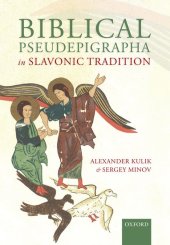 Neuerscheinungen 2016Stand: 2020-02-01 |
Schnellsuche
ISBN/Stichwort/Autor
|
Herderstraße 10
10625 Berlin
Tel.: 030 315 714 16
Fax 030 315 714 14
info@buchspektrum.de |

Alexander Kulik, Sergey Minov
(Beteiligte)
Biblical Pseudepigrapha in Slavonic Tradition
2016. 432 S. 253 mm
Verlag/Jahr: OXFORD UNIVERSITY PRESS 2016
ISBN: 0-19-959094-X (019959094X)
Neue ISBN: 978-0-19-959094-0 (9780199590940)
Preis und Lieferzeit: Bitte klicken
This book provides the first collection of Slavonic pseudepigrapha translated into a western European language. It includes the original texts, their translations, and commentaries focusing on the history of motifs and based on the study of parallel material in ancient and medieval Jewish and Christian literature.
Early Slavonic writings have preserved a unique corpus of compositions that develop biblical themes. These extracanonical, parabiblical narratives are known as pseudepigrapha, and they preserve many ancient traditions neglected by the canonical scriptures. They feature tales of paradise and hell, angels and Satan, the antediluvian fathers and biblical patriarchs, kings, and prophets. These writings address diverse questions ranging from artistically presented
questions of theology and morals to esoteric subjects such as cosmology, demonology, messianic expectations, and eschatology.
Although these Slavonic texts themselves date from a relatively late period, they are translations or reworkings of far earlier texts and traditions, many of them arguably going back to late biblical or early postbiblical times. The material in these works can contribute significantly to a better understanding of the roots of postbiblical mysticism, rabbinic Judaism and early Christianity, ancient and medieval dualistic movements, as well as the beginnings of the Slavonic literary tradition.
The volume provides a collection of the minor biblical pseudepigrapha preserved solely in Slavonic; at the same time, it is also the first collection of Slavonic pseudepigrapha translated into a western European language. It includes the original texts, their translations, and commentaries focusing on the history of motifs and based on the study of parallel material in ancient and medieval Jewish and Christian literature.
The aim of the volume is to to bridge the gap between the textual study of this corpus and its contextualization in early Jewish, early Christian, rabbinic, Byzantine, and other traditions, as well as to introduce these texts into the interdisciplinary discussion of the intercultural transmission of ideas and motifs.
[The authors] find parallels in the motives of the Slavic pseudepigrapha in unexpected places - Old Irish, Scandanavian, medieval Latin, Arabic and Armenian mythology and texts as well as Zoroastrian sources - indicating the extremely deep familiarity the authors have with their subject. At points, the authors also suggest an East Slavic origin for some of the pseudepigraphic texts. There is an impressive bibliography with books in more than ten languages and three indexes. Illya Bey, Reading Religion
Alexander Kulik is Associate Professor and Chairman of the Department of German, Russian and East European Studies at the Hebrew University of Jerusalem. He held visiting positions at Harvard, Moscow State University, University College London, Stanford, Freie Universitaet Berlin. Kulik authored two books: Retroverting Slavonic Pseudepigrapha (Society of Biblical Literature: Atlanta GA, 2004 and Leiden-Boston: Brill, 2005), 3 Baruch: Greek-Slavonic Apocalypse of
Baruch (Berlin-New York: Walter de Gruyter, 2009), and edited the collected volume History of the Jews in Russia: From Antiquity to Early Modern Period with Zalman Shazar Center (Jerusalem) and Gesharim (Moscow). Kulik has founded and headed the Brill book series Studia Judaeoslavica
Sergey Minov has completed his doctoral studies at the Hebrew University of Jerusalem, specializing in the history of ancient Judaism and Christianity, apocryphal literature and biblical exegesis.


